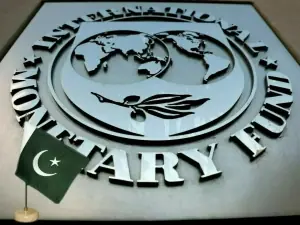Floods in 2022 cost Pakistan $30b, only $10.9b in aid received, minister says
4 min readFederal Minister for Planning, Development and Special Initiatives Ahsan Iqbal stated that the floods in 2022 caused total damages amounting to $30 billion in Pakistan. The estimated recovery needs are $16.2 billion, with pledges received so far totaling $10.9 billion, resulting in a funding shortfall of $17.1 billion.
Iqbal shared these insights during the 4th meeting of the Policy and Strategy Committee (PSC) and the Oversight Board focused on post-flood reconstruction efforts.
The meeting included the Secretary of Planning, the Secretary of Economic Affairs, chief secretaries from all provinces, country directors from the World Bank and Asian Development Bank (ADB), the UN resident coordinator, the UNDP resident representative, the EU deputy head of mission, and senior officials from the Planning Commission.
The minister reported that the Post-Disaster Needs Assessment (PDNA) indicated total damages surpassing $14.9 billion, with economic losses amounting to $15.2 billion.
He highlighted that the assessment forecasted a significant rise in food insecurity, predicting that the number of affected individuals would increase from seven million to 14.6 million.
Moreover, over two million housing units were impacted, with 780,000 destroyed and more than 1.2 million suffering partial damage.
In his opening remarks, Minister Iqbal described the unprecedented disaster that hit Pakistan from June to August 2022, caused by heavy rains, river floods, and urban flash floods.
He noted that one-third of the country was underwater, affecting 33 million people and displacing nearly eight million. More than half of the districts in Sindh, Balochistan, and Khyber Pakhtunkhwa were declared disaster-affected.
In response to the 2022 floods, the Ministry of Planning formulated the Government of Pakistan’s strategic policy, called the Resilient, Rehabilitation, and Reconstruction Framework (4RF).
The 4RF outlined four main objectives: improving governance and institutional capacity to restore lives and livelihoods, revitalizing economic opportunities, promoting social inclusion and participation, and restoring and enhancing basic services and infrastructure in a resilient and sustainable way.
The planning minister stressed the importance of collaboration between Pakistan and its development partners in the aftermath of the catastrophic 2022 floods. He mentioned that several initiatives were launched in response to the disaster, with significant commitments from international partners.
He emphasized the need for prompt and effective implementation of projects aimed at rebuilding affected communities and restoring livelihoods. He stated, “The aim of this forum is to evaluate the progress of projects agreed upon by federal and provincial governments and our development partners, while establishing a strong monitoring and evaluation mechanism to ensure transparency and efficiency, thereby building greater trust among our partners.”
Addressing the challenges, Minister Iqbal pointed out a contradiction in the approach taken by development partners regarding resilience and adaptation. “Initially, we were encouraged to concentrate on long-term adaptation and resilience. However, as the Geneva Conference approached, partners suggested a shift to short-term projects due to the high costs of adaptation. Nevertheless, the 4RF document fully integrates adaptation and resilience components to prepare us for future challenges,” he explained.
The minister also highlighted the urgent need to tackle the impacts of climate change, noting significant weather changes and considerable losses in agricultural production, particularly in cotton crops this year.
Read more
Pakistan needs over $16b for post flood reconstruction: report
ADB green lights $554m package for flood relief efforts in Pakistan
World Bank to provide $1.69 bn for flood affected people in Sindh
While discussing the Integrated Flood Resilience and Adaptation Project (IFRAP), the minister expressed concerns about the slow progress in flood reconstruction efforts in Balochistan, highlighting the need for faster action in this underdeveloped region.
He noted that the $400 million IFRAP aims to help around 35,100 homeowners with housing reconstruction grants to rebuild their homes according to resilience standards.
The project will also provide livelihood grants to smallholder farmers to support livestock, promote climate-smart agriculture, and enhance other productive activities. Additionally, it focuses on restoring essential services by rehabilitating damaged community infrastructure, including water supply, irrigation, roads, and other amenities.
Minister Iqbal instructed all relevant ministries to identify and address the gaps and obstacles impeding flood-resilient projects, emphasizing a zero-tolerance policy for delays. He also mandated that incomplete PC-I documents be returned within 15 days to prevent further holdups.
For the latest news, follow us on Twitter @Aaj_Urdu. We are also on Facebook, Instagram and YouTube.

























Comments are closed on this story.